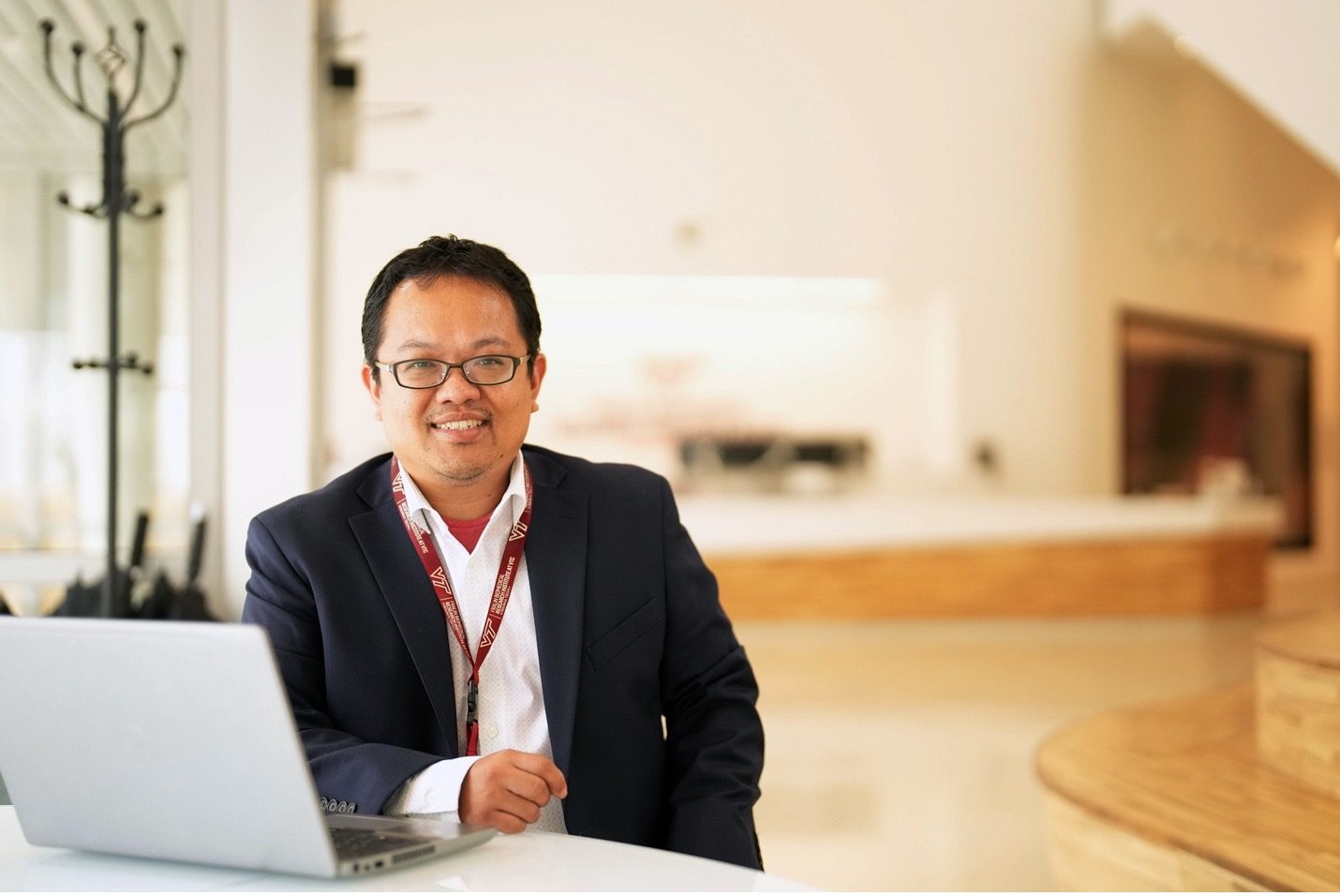A physician-scientist who treats brain tumors in children has joined Virginia Tech to bring his expertise in focused ultrasound cancer research to the Fralin Biomedical Research Institute at VTC, said Michael Friedlander, executive director of the research institute and Virginia Tech vice president for health sciences and technology.
Cheng-Chia “Fred” Wu will focus on advancing the use of low-intensity focused ultrasound to treat pediatric brain tumors through his work at the Fralin Biomedical Research Institute in Roanoke and at Children’s National Brain Tumor Institute at its Research & Innovation Campus in Washington, D.C., said Michael Friedlander, executive director of the Fralin Biomedical Research Institute at VTC and Virginia Tech vice president for health sciences and technology
Wu aims to leverage technological advances being made in low-intensity focused ultrasound at Virginia Tech labs with patient clinical trial expertise at Children’s National to improve cancer care.

“I’m excited that Children’s National and Virginia Tech have invested in focused ultrasound and both are recognized independently by the Focused Ultrasound Foundation as centers of excellence,” said Wu, assistant professor of the Fralin Biomedical Research Institute. “Partnering with Children’s National connects us to a world-class clinical trial institute that has been a pioneer in treating brain tumors with focused ultrasound technology, and this presents a unique opportunity to help children and families struggling with cancer. I’m also excited by the community health conversations I’ve been having with physicians at Children’s National, the Virginia Tech Carilion School of Medicine, and Carilion Clinic. I can’t wait to see where this takes us.”
Wu will also work with collaborators with the Fralin Biomedical Research Institute, the College of Engineering, and the Virginia-Maryland College of Veterinary Medicine’s Animal Cancer Care and Research Center.
Before joining Virginia Tech, Wu was an assistant professor of radiation oncology at Columbia University Irving Medical Center, where he treated pediatric cancers and central nervous system malignancies in a clinical role alongside of leading a research laboratory.
He played a key role in the Initiative for Drug Delivery Innovation for Childhood Brain Tumors at Columbia, developing a bench-to-bedside platform to facilitate the translation of promising technologies for targeted drug delivery in children with brain tumors.
Within three years, the team demonstrated safety and feasibility of using focused ultrasound to treat cancer in the brainstem, as well as adding radiation, in preclinical models. They opened two clinical trials for kids with relapsed diffuse midline glioma, which is a type of aggressive and difficult-to-treat brain tumor that occurs in the brain stem, thalamus, and spinal cord.
Wu works closely with Hong-Jian “James” Wei, a cancer biologist and Fralin Biomedical Research Institute research assistant professor based in Roanoke.
“Treating kids with cancer can be difficult in the sense that when you’re talking about patients, it’s not just the child who has cancer,” Wu said. “Your patients also involve the mom, the dad, the siblings, and their community. Everyone in the entire family ecosystem are your patients. But you also get to witness this overwhelming sense of love and support for one another. It’s really a blessing to part of the treatment team.”
Wu, who will continue to see patients in research protocols, was recruited after a competitive search, Friedlander said. Although he is a faculty member at Fralin Biomedical Research Institute with Virginia Tech, he will work hand-in-hand with colleagues at Children’s National Hospital.
“Dr. Wu is a great fit for the team research underway at Virginia Tech and Children’s National,” Friedlander said. “His experience as a pediatric radiation oncologist, translational physician scientist, and a clinical trialist leading an innovative drug delivery program gives him a unique set of skills to identify promising new technology and implement it in areas of need for treatment of pediatric cancers. In addition, we can actively start thinking about possibilities to integrate focused ultrasound in community health settings with Carilion Clinic and Children’s National.”

Catherine Bollard, director of the Center for Cancer and Immunology Research and interim chief academic officer at Children’s National Hospital, said, “Collaboration is essential to solving formidable challenges in science, and we are thrilled to be working with Dr. Wu to develop cutting-edge therapeutics for pediatric brain tumors. With Dr. Wu’s experience and the talents of our team at Children’s National, I have great hope that we will be able to combine our novel technologies and therapies to provide tremendous breakthroughs for treating pediatric patients with brain tumors.”
Wu is also a faculty member of the Department of Internal Medicine of the Virginia Tech Carilion School of Medicine with an affiliated appointment in the Department of Biomedical Engineering and Mechanics.
He is already involved with projects with scientists at Fralin Biomedical Research Institute, veterinarians at Virginia Tech’s Animal Cancer Care and Research Center, and biomedical engineers with the College of Engineering.
“Virginia Tech’s cancer research effort is making inroads in high-intensity and well as low-intensity focused ultrasound,” Wu said. “Furthermore, these technologies are being clinically tested in the veterinary space to help canine patients with aggressive tumors, which makes it an extremely novel program.”
Fralin Biomedical Research Institute Cancer Research Center programs have benefitted from the support of the Red Gates Foundation.
Jennifer Munson, a biomedical engineer, and Christopher Hourigan, a physician-scientist, lead the respective sites in Roanoke and Washington, D.C., and will work with Wu to help translate new technology from laboratory to clinical settings.
By John Pastor

